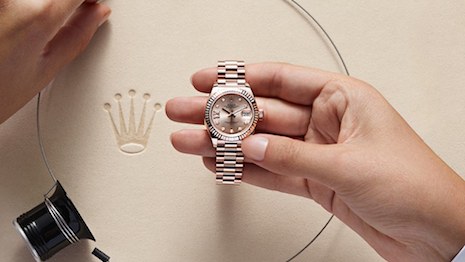 BMW ranks as highest luxury brand on the authenticity top 100. Image courtesy of BMW
BMW ranks as highest luxury brand on the authenticity top 100. Image courtesy of BMW
Within their respective industries, luxury brands are commonly perceived as high-quality, but consumers feel as though most are not listening, according to a new report from Cohn & Wolfe. Amongst the top 50 brands listed as a part of Cohn & Wolfe's rankings, luxury fashion marketers were noticeably absent. While in the past, authenticity was almost synonymous with heritage, today consumers are looking for a brand's intention.
"On average, luxury brands are only perceived to be moderately authentic," said Lynn Fisher, executive vice president and global director of the branding & insights group at Cohn & Wolfe. "As an industry they are seen as delivering well on reliable quality, but they fall short on the key authenticity driver, 'respect.'
"Our research has shown this indicates that consumers lack the feeling that luxury brands are listening and responding to them," she said. "This represents an opportunity for today’s luxury brands: to break away as a brand that is genuinely engaging and involving consumers at a level that will set them apart as uniquely authentic." Brand authenticity German automaker BMW ranked as the highest luxury brand on Cohn & Wolfe's top 100 authentic brands at nine, followed by Rolex at 11. Luxury auto brands make up a significant portion of the list, with BMW, Mercedes and Audi all making the top 20, followed closest by Porsche in spot 35. Fashion brands do not make an appearance until spot 65 with Louis Vuitton.
Cohn & Wolfe explained that luxury brands are falling short on respect, which is now what drives authenticity. While their industries believe their quality is authentic, consumers do not believe their brands are authentic.
Consumers feel jilted with luxury brands in their listening and responsiveness, customers want to know that they are being heard and appreciated. The luxury industry lacks severely in this notion.
Luxury marketers need to face this problem head on and look to the future with a focus on interaction and engagement. Technology has opened the door for luxury brands to do this better than before, and consumers have now come to expect this type of engagement and brand experience.
While the luxury industry has long used brand heritage to carry it along, the new, digital era calls for greater authenticity than that. Consumers are looking for a brand's purpose and how it affects the greater good.
Individuals are looking to see if brands are helping making a difference in communities, the environment and to helping, and not just looking for profit.
Additional insight
Despite portrayals of the millennial generation as anti-luxury, a new study finds that most women in this age group would prefer having fewer items that are of a higher quality.
The Diamond Producers Association’s “What Women Really Want” survey found that 64 percent of millennial women would rather purchase a single luxury item over many less expensive pieces. According to the report, these consumers look at luxury, including jewelry, as an investment in themselves and look for the real deal over knockoffs (see more).
Luxury auto brands make up a significant portion of the list, with BMW, Mercedes and Audi all making the top 20, followed closest by Porsche in spot 35. Fashion brands do not make an appearance until spot 65 with Louis Vuitton.
Cohn & Wolfe explained that luxury brands are falling short on respect, which is now what drives authenticity. While their industries believe their quality is authentic, consumers do not believe their brands are authentic.
Consumers feel jilted with luxury brands in their listening and responsiveness, customers want to know that they are being heard and appreciated. The luxury industry lacks severely in this notion.
Luxury marketers need to face this problem head on and look to the future with a focus on interaction and engagement. Technology has opened the door for luxury brands to do this better than before, and consumers have now come to expect this type of engagement and brand experience.
While the luxury industry has long used brand heritage to carry it along, the new, digital era calls for greater authenticity than that. Consumers are looking for a brand's purpose and how it affects the greater good.
Individuals are looking to see if brands are helping making a difference in communities, the environment and to helping, and not just looking for profit.
Additional insight
Despite portrayals of the millennial generation as anti-luxury, a new study finds that most women in this age group would prefer having fewer items that are of a higher quality.
The Diamond Producers Association’s “What Women Really Want” survey found that 64 percent of millennial women would rather purchase a single luxury item over many less expensive pieces. According to the report, these consumers look at luxury, including jewelry, as an investment in themselves and look for the real deal over knockoffs (see more).
 A still from the DPA's Real is Rare campaign. Image credit: Diamond Producers Association
A still from the DPA's Real is Rare campaign. Image credit: Diamond Producers Association
"Marketers often associate brand authenticity with the heritage or origins of a brand and our study of consumers’ perceptions confirms that heritage drives authenticity to some extent," Ms. Fisher said. "But, surprisingly, today’s consumer is looking more at what they see as the brand’s purpose and intention for the future — how much they believe the brand is truly committed to benefiting people and communities beyond just providing their products.
"Is the brand genuinely working to make life better for the future? Does the company respect and care about people as much as profit? These are the new criteria for authenticity today."